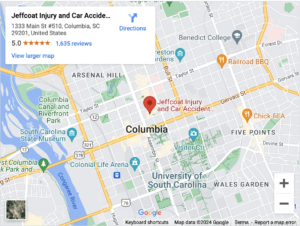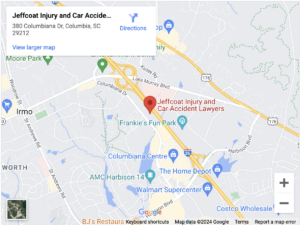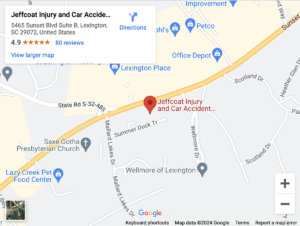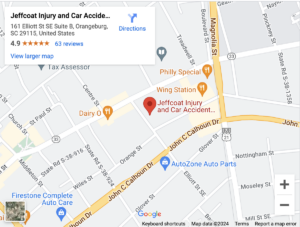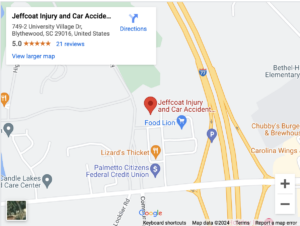June 11, 2025 | Columbia Personal Injury Blog

Understanding the Impact of At-Fault Accidents on Your Insurance Premiums
Getting into a car accident is stressful enough, but the aftermath of an at-fault collision can continue to affect your finances long after the vehicles have been repaired. Many South Carolina drivers are shocked when they see their insurance premiums increase following an accident, and even more surprised by how long these rate hikes can persist. If you’re dealing with the financial fallout of an at-fault accident, you’re likely wondering exactly how long you’ll be paying higher insurance rates and what options you might have to mitigate these costs. This uncertainty can add significant stress during an already difficult time, especially when insurance communications seem designed to confuse rather than clarify.
Don’t let the stress of increased insurance rates weigh you down after an at-fault accident. Reach out to Jeffcoat Injury and Car Accident Lawyers for guidance on navigating these challenges. Give us a call at (803) 200-2000 or contact us today to explore your options and protect your financial future.

South Carolina Insurance Laws and Rate Increases After Accidents
In South Carolina, insurance companies are permitted to raise your rates after an at-fault accident, but these increases aren’t arbitrary. The South Carolina Department of Insurance regulates insurance practices in the state, ensuring that rate increases follow established guidelines. While each insurance company has its own formula for calculating premium increases, most follow a similar pattern when it comes to at-fault accidents. Generally, insurance companies in South Carolina consider your driving history for the past 3-5 years when determining your premium rates. This means that an at-fault accident will typically affect your insurance rates for this duration, though the impact usually diminishes over time. It’s important to understand that South Carolina follows a modified comparative negligence rule, which means your degree of fault in the accident can affect not only your insurance claim but potentially the duration and severity of premium increases. Having a thorough understanding of these laws can help you navigate the insurance landscape more effectively after an accident.
The Timeline: How Long Will Higher Rates Last?
When you’re facing increased insurance premiums after an at-fault accident, understanding the typical timeline can help you plan financially and make informed decisions about your coverage. While individual insurance companies may have different policies, there are some common patterns in how long accident surcharges remain on your policy in South Carolina. The impact on your rates will also vary based on several factors specific to your situation and driving history.
-
Most insurance companies in South Carolina will keep an at-fault accident on your record for 3-5 years, with premium increases typically being highest in the first 1-2 years and gradually decreasing thereafter.
-
The severity of the accident plays a significant role in determining both the amount and duration of rate increases. An accident resulting in substantial property damage or bodily injury will likely impact your rates more severely and for a longer period than a minor fender bender.
-
First-time accidents generally have less impact on long-term rates than multiple accidents. If you have a previously clean driving record, some insurance companies may offer accident forgiveness that prevents rate increases for your first accident.
-
Insurance companies typically recalculate your premiums at each renewal period (usually every 6 months), which means you may see gradual decreases in your premium as the accident ages on your record.
-
Safe driving after an accident can help offset rate increases. Most insurers offer good driver discounts that can be reinstated after a period of accident-free driving, typically 6 months to a year.
Managing Insurance Rate Increases: Strategies for South Carolina Drivers
Facing higher insurance premiums doesn’t mean you’re without options. There are several proactive steps you can take to minimize the financial impact of an at-fault accident on your insurance rates. First, consider taking a defensive driving course approved by the South Carolina Department of Motor Vehicles. Many insurance companies offer discounts to drivers who complete these courses, which can help offset some of the rate increases. Second, review your current coverage to ensure you’re not over-insured in some areas—adjusting deductibles and removing unnecessary coverage can lower your premium while maintaining essential protection. Third, don’t hesitate to shop around for new coverage. Different insurance companies weigh accidents differently in their pricing models, and you might find substantial savings by switching carriers even with an accident on your record. At Jeffcoat Injury and Car Accident Lawyers, we’ve seen many clients successfully navigate insurance challenges after accidents. Our team understands the nuances of South Carolina insurance law and can provide guidance on dealing with insurance companies after an accident. If you believe your insurance company is unfairly penalizing you or if there are disputes about fault in your accident, consulting with a car accident lawyer in Columbia SC can help ensure your rights are protected throughout the claims process.
Factors That Influence How Long an Accident Affects Your Insurance Rates
The duration and severity of insurance premium increases after an at-fault accident aren’t determined by a simple formula. Insurance companies consider multiple factors when deciding how long to keep surcharges on your policy. Understanding these factors can help you better predict and potentially mitigate the long-term financial impact of an accident on your insurance rates in South Carolina.
Your Driving History and Its Impact on Post-Accident Rates
Your driving record before the accident significantly influences how much and how long your rates will increase after an at-fault incident. For drivers with previously clean records, many insurance companies are more lenient, possibly offering accident forgiveness programs or smaller rate increases that diminish more quickly. Conversely, if you have previous violations or accidents, an additional at-fault accident can lead to steeper and more persistent rate hikes. Some drivers may even be classified as “high-risk” after multiple incidents, which can extend the impact on insurance rates beyond the typical 3-5 year window. We’ve observed that insurance companies in the Columbia area often take a more nuanced approach to first-time accidents for long-term customers, sometimes reducing the duration of surcharges for drivers who have maintained policies with them for several years.
Special Considerations for South Carolina Drivers
South Carolina has specific insurance regulations and market conditions that can affect how long an at-fault accident impacts your insurance rates. Being aware of these state-specific factors can help you navigate the post-accident insurance landscape more effectively and potentially find ways to reduce the duration of higher premiums.
South Carolina’s Insurance Rating System and Accident Reporting
South Carolina uses a unique insurance rating system that affects how accidents influence your premiums. The state requires all accidents resulting in injury, death, or property damage exceeding $1,000 to be reported to the Department of Motor Vehicles (DMV). These reported accidents become part of your driving record, which insurance companies can access when determining your rates. However, it’s important to note that not all minor accidents necessarily need to be reported if they fall below this threshold. Additionally, South Carolina has a three-year lookback period for most driving violations in terms of DMV points, though insurance companies often maintain their own longer lookback periods of up to five years for premium calculation purposes. Understanding these distinctions can be crucial when discussing your accident history with insurance providers or when shopping for new coverage.
Strategies to Reduce the Impact of At-Fault Accidents on Insurance Rates
While you can’t erase an at-fault accident from your record, there are several proactive measures you can take to reduce its impact on your insurance premiums. Implementing these strategies can help you regain control of your insurance costs and potentially shorten the duration of rate increases following an accident in South Carolina.
Exploring Discounts and Alternative Coverage Options
After an at-fault accident, actively seeking out available discounts becomes even more important. Many South Carolina insurance providers offer various discount programs that can help offset rate increases. These may include multi-policy discounts if you bundle home and auto insurance, good student discounts for young drivers, discounts for vehicles with advanced safety features, or loyalty discounts for long-term customers. Additionally, some insurers offer usage-based insurance programs that track your driving habits through a mobile app or device installed in your vehicle. These programs can be particularly beneficial after an accident, as they allow you to demonstrate your commitment to safe driving and potentially earn personalized rate reductions based on your actual driving behavior rather than just your accident history. Participating in these programs might help you reduce the duration of accident-related surcharges by proving you’re a lower risk than your record suggests.
Disputing Fault and Its Impact on Insurance Duration
The determination of fault in an accident can significantly affect how long and how severely your insurance rates are impacted. In South Carolina, being found partially at fault rather than fully at fault can make a substantial difference in your insurance outcomes. Understanding how fault is determined and knowing when and how to dispute a fault determination can potentially save you thousands of dollars in premium increases over time.
Working with Legal Representation to Challenge Fault Determinations
When fault in an accident is unclear or disputed, working with a qualified South Carolina car accident attorney can make a significant difference in the outcome. Insurance companies often make quick fault determinations that may not accurately reflect all circumstances of the accident. A car accident lawyer in Columbia SC can help gather evidence, interview witnesses, analyze police reports, and even work with accident reconstruction experts to challenge incorrect fault assessments. Successfully reducing your percentage of fault or proving you weren’t at fault can prevent years of insurance surcharges. Even in cases where you were partially at fault, proper legal representation can help ensure that your degree of fault is accurately assessed under South Carolina’s comparative negligence rules, potentially reducing the severity and duration of insurance penalties.
Frequently Asked Questions
1. How much will my insurance rates increase after an at-fault accident in South Carolina?
While the exact increase varies by insurance company, South Carolina drivers typically see rate increases of 30-50% after an at-fault accident. The severity of the accident, your previous driving history, and your insurance company’s specific rating system all influence the exact percentage. First-time accidents generally result in smaller increases than subsequent accidents. Premium increases are usually highest during the first renewal period after the accident and may gradually decrease over the 3-5 years the accident remains on your record.
2. Can a Columbia car injury lawyer help reduce how long an accident affects my insurance?
Yes, a Columbia car injury lawyer can potentially help reduce the duration and severity of insurance impacts by challenging fault determinations. If your attorney can successfully argue that you were less at fault than initially determined or not at fault at all, this can significantly change how insurance companies treat the accident. Additionally, a South Carolina car accident attorney can review settlement agreements to ensure they don’t contain language that unnecessarily admits fault, which could extend the insurance impact. Legal representation is particularly valuable in complex accidents where fault isn’t immediately clear.
3. Do I need to disclose my accident history when switching to a new insurance company in Columbia?
Yes, you should always disclose your accident history when applying for new insurance coverage. Insurance companies in South Carolina have access to your driving record and claims history through various databases, and they will discover past accidents during the underwriting process. Failing to disclose accidents could be considered misrepresentation and might result in policy cancellation or denial of claims. However, shopping around after an accident is still worthwhile as different Columbia auto accident attorneys have different approaches to rating accidents, and you might find more favorable rates despite needing to disclose your history.
4. How does South Carolina’s comparative negligence law affect insurance rates after a partial-fault accident?
South Carolina follows a modified comparative negligence rule, which means that if you’re found to be less than 51% at fault, you can still recover damages proportional to the other driver’s fault percentage. This same principle often applies to how insurance companies calculate rate increases. If you’re determined to be partially at fault (for example, 30%), your insurance rate increase might be less severe than if you were 100% at fault. The specific impact depends on your insurance company’s rating system, but generally, a lower percentage of fault results in a less dramatic and potentially shorter-duration rate increase.
5. Can taking a defensive driving course in South Carolina reduce the time an accident affects my insurance rates?
Taking an approved defensive driving course in South Carolina can potentially reduce the duration of insurance impacts following an at-fault accident. Many insurance companies offer discounts to drivers who complete these courses, which can offset some of the rate increases caused by the accident. Additionally, some insurers may consider defensive driving course completion as a mitigating factor when determining how long to apply accident surcharges. The specific benefits vary by insurance provider, but completing a course typically demonstrates your commitment to safe driving and may help you return to standard rates more quickly. Contact your insurance provider to ask about approved courses and potential discount programs.
Work with a Auto Accidents Lawyer
Navigating the aftermath of an at-fault accident and its long-term insurance implications can be overwhelming. While understanding how long your rates may be affected is important, addressing the underlying issues related to accident determination and insurance company practices often requires professional guidance. A qualified auto accident attorney can review the circumstances of your accident, advise you on insurance matters, and help protect your rights throughout the claims process. If you believe your accident was incorrectly classified as at-fault, or if you’re facing exceptionally harsh insurance penalties, legal representation may help mitigate these consequences. Additionally, an attorney can assist with more complex situations such as accidents involving uninsured motorists, disputed liability, or serious injuries that may have implications beyond just insurance rates. When selecting legal representation, look for attorneys with specific experience in South Carolina’s auto insurance laws and a track record of successfully handling cases similar to yours.
Feeling overwhelmed by the financial strain of increased insurance rates after an at-fault accident? Let Jeffcoat Injury and Car Accident Lawyers lend a helping hand. Reach out to us at (803) 200-2000 or contact us to explore your options and safeguard your financial well-being.

